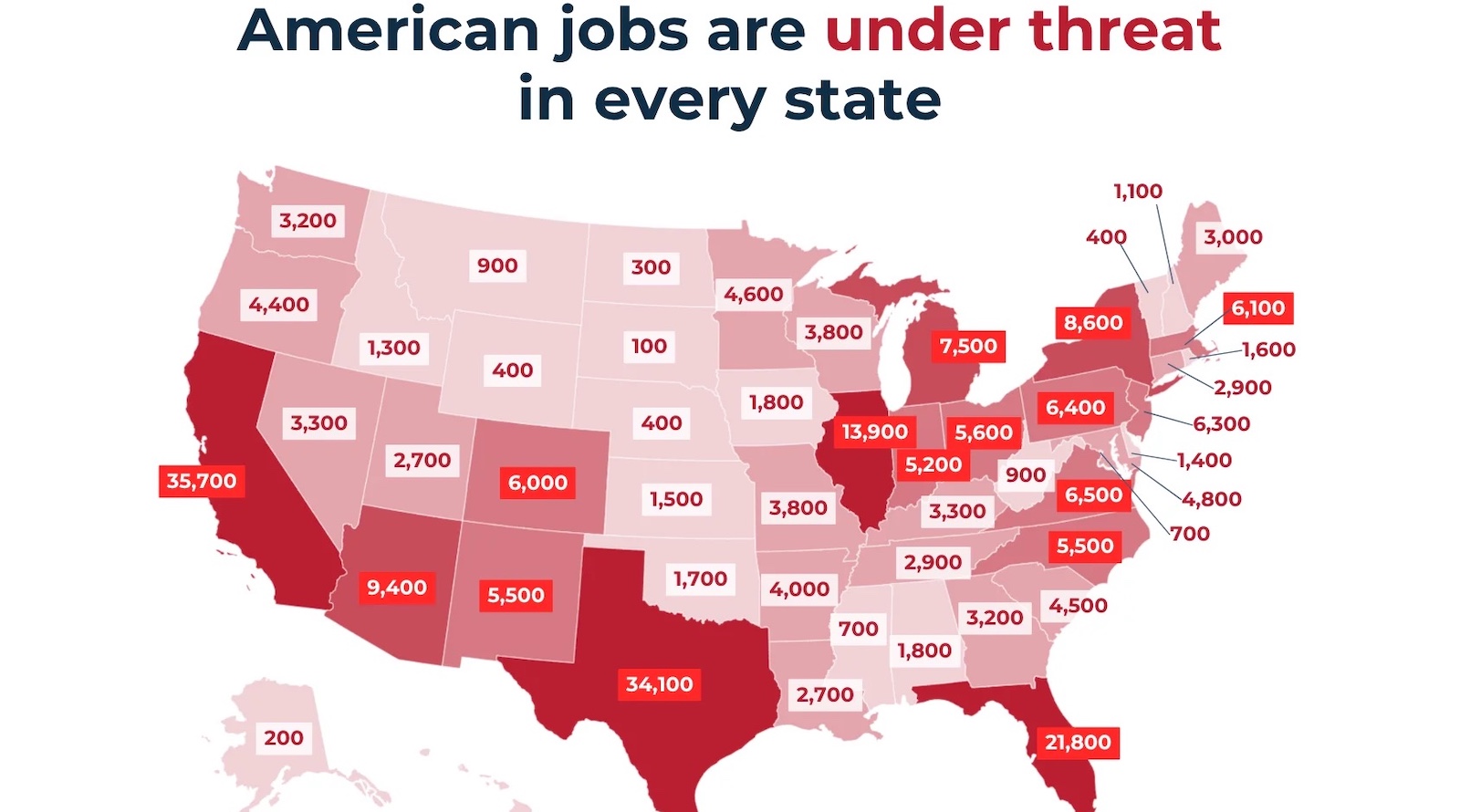High energy bills are in store this summer as the cost of natural gas goes up alongside the temperatures. Crank up the AC, and you’ll pay through the nose. The US solar industry is among the stakeholders offering sustainable solutions. Meanwhile, the Republicans also have their solution: Make it worse — especially for their own constituents!
Thank Your Republican Representatives In Congress For These High Energy Bills And Job Loss, Too
For reasons best known only to itself, the Biden administration lavished federal grants and loans for new solar manufacturing facilities in states that voted for Trump in 2024. Perhaps they were under the impression that a new paycheck could suddenly reverse decades of baked-in party identification along with all the familial and social connections that attend it. Oopsies!
With Congress now considering a federal budget bill that will eliminate the very programs that have supported the manufacturing boom, the new Solar Market Insight report from the trade organization Solar Energy Industries Association and the consulting firm Wood Mackenzie lays it on the line:
“If Congress fails to modify the changes to energy tax incentives passed by the House, jobs, investments, and factories in Trump country will be hit the hardest.”
Ouch! CleanTechnica has been following the progress of the domestic solar manufacturing industry, which has indeed been marked by booming activity in the Trump-voting state of Texas among others (see more US solar factory news here).
The impact of the new budget bill on solar factories is just for starters. Solar installers in Trump-voting states are in for a world of hurt as well:
“Of the top ten states with the most solar installations in the first quarter, eight were won by President Donald Trump in the 2024 election: Texas, Florida, Ohio, Indiana, Arizona, Wisconsin, Idaho, and Pennsylvania.”
Woe Is Us: High Energy Bills Are Coming
Meanwhile, everyone is talking about high energy bills, and everyone is blaming Republicans. Other non-Republican factors are also at work, but Republicans getting blamed, and the blame will hit #11 on the dial if they pass Trump’s “Big Beautiful Bill,” which is the name Trump has conferred on the new budget bill, and adopted by House Republicans.
That’s right, House Republicans. While the new SEIA report simply indicates that “Congress” needs to fix the “Big Beautiful Bill,” what they really mean is that Republicans need to fix it, because they are the only ones who can fix it.
The Republican party currently has majority control of the House of Representatives, and they passed the BBB last month with provisions aimed at killing off the domestic solar industry.
Now the BBB heads to the US Senate, where the Senators could decide to reverse the changes made by their colleagues in the House, and preserve tax credits and other Biden-era elements that support the nation’s renewable energy industries.
Republican members of the Senate could even exercise the power of Congress to compel the Trump administration to reverse new policies that summarily pulled the rug out from under the nation’s longstanding energy efficiency and clean power research programs, which come under the umbrella of the US Environmental Protection Agency and the Department of Energy.
JK! The Senate is also controlled by the Republican majority, and so here we are.
Here’s One Solution For High Energy Bills: Build More Gas Power Plants
The Washington Post and The New York Times are among the many news organizations talking up the subject of high energy bills this week. Forbes, in particular, has a good rundown on the factors pushing up natural gas prices.
Financial advisors are also zeroing in on the rising cost of energy. Unlike some in the Trump-skittish media world of today, financial advisors can be brutally honest about who to blame for what, and they are pulling no punches. The leading firm Kiplinger, for example, leads off a new advisory for home owners with with this headline: “If passed, the ‘Big Beautiful Bill’ could make home energy upgrades more expensive and raise monthly costs.”
Tell it, Kiplinger. “The proposed bill would repeal Biden-era tax credits incentivizing taxpayers to make their homes and businesses more energy efficient,” the firm observers.
“With the tax breaks gone, alternative energy generation equipment such as solar panels and wind turbines may become more expensive,” they add.
“Power plants may then become more reliant on natural gas to generate electricity, causing natural gas prices to inflate. Electric companies would likely pass the increase in costs to consumers,” Kiplinger adds again for good measure, noting that 40% of the nation’s generating capacity currently comes from natural gas.
The Solar Energy Solution
The Republican party is determined to cut off their own constituents’ noses to maximize the hurt of high energy bills, even though the solution is staring them right in the face. The solar lobby argues, correctly, that the domestic solar industry can fulfill the nation’s growing thirst for electricity at a lower cost than natural gas, and with much shorter lead times for construction.
Everyone who voted for President Joe Biden in 2020 can give themselves a round of applause for making that happen. Without Biden-era programs, the domestic solar manufacturing industry would still be puttering along on three cylinders.
Instead, SEIA notes that the US added another 8.6 gigawatts in new solar module manufacturing capacity in Q1 2025, the third-largest quarter for growth on record. To the surprise of nobody, all 8.6 gigawatts of new capacity came from new or expanded factories in the Trump-voting states of Texas, Ohio, and Arizona.
If tax policies that support the solar installation industry evaporate, where are those factories going to sell their solar modules? The domestic market for solar products will shrink, and they will be stuck. They will have to eliminate jobs and reduce their output, or shut down entirely.
As for whether or not those Trump-voting factories keep churning out the solar modules, that’s up to the Republican members of the House and Senate.
“House-passed federal tax legislation threatens to undercut the solar industry, which is the primary source of new U.S. electricity generation and is delivering a historic boom in domestic manufacturing,” SEIA and Wood Mackenzie remind everyone.
What About The Byrd Rule?
Now that some Republican members of the House have confessed to voting for the BBB without reading it, one can assume that members of the Senate will scrutinize the bill line by line.
One thing they’ll be looking for — Republicans and Democrats like — are provisions that can be scratched under the “Byrd Rule,” which prohibits reconciliation bills like the BBB from including matters not directly related to the federal budget.
As for your high energy bills, Election Day 2028 is just around the corner…
Photo: via CleanTechnica archive.

Sign up for CleanTechnica’s Weekly Substack for Zach and Scott’s in-depth analyses and high level summaries, sign up for our daily newsletter, and follow us on Google News!


Whether you have solar power or not, please complete our latest solar power survey.
Have a tip for CleanTechnica? Want to advertise? Want to suggest a guest for our CleanTech Talk podcast? Contact us here.
Sign up for our daily newsletter for 15 new cleantech stories a day. Or sign up for our weekly one on top stories of the week if daily is too frequent.
CleanTechnica uses affiliate links. See our policy here.
CleanTechnica’s Comment Policy

